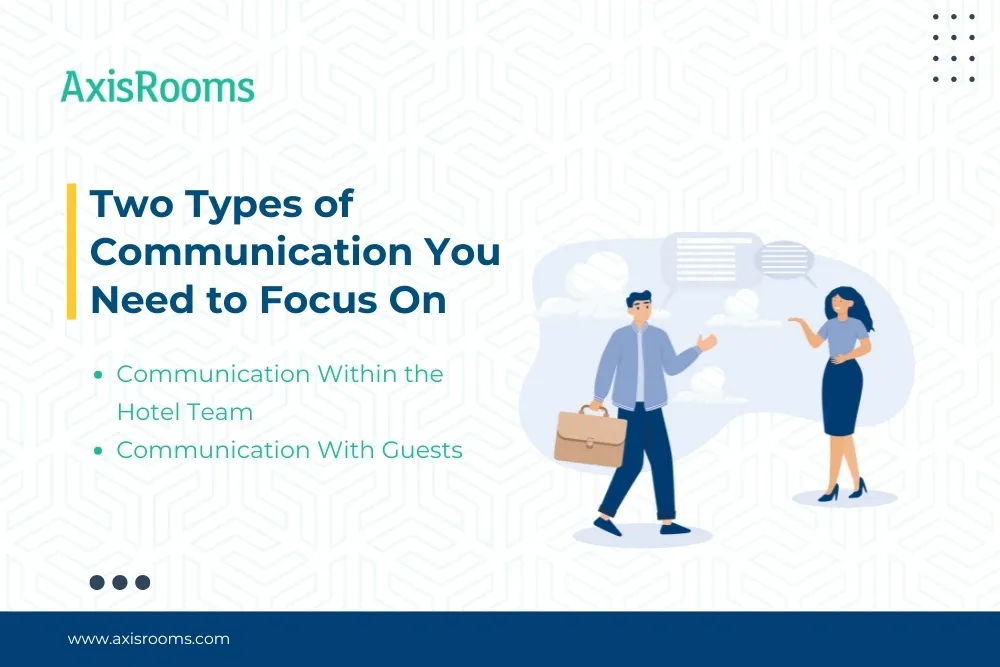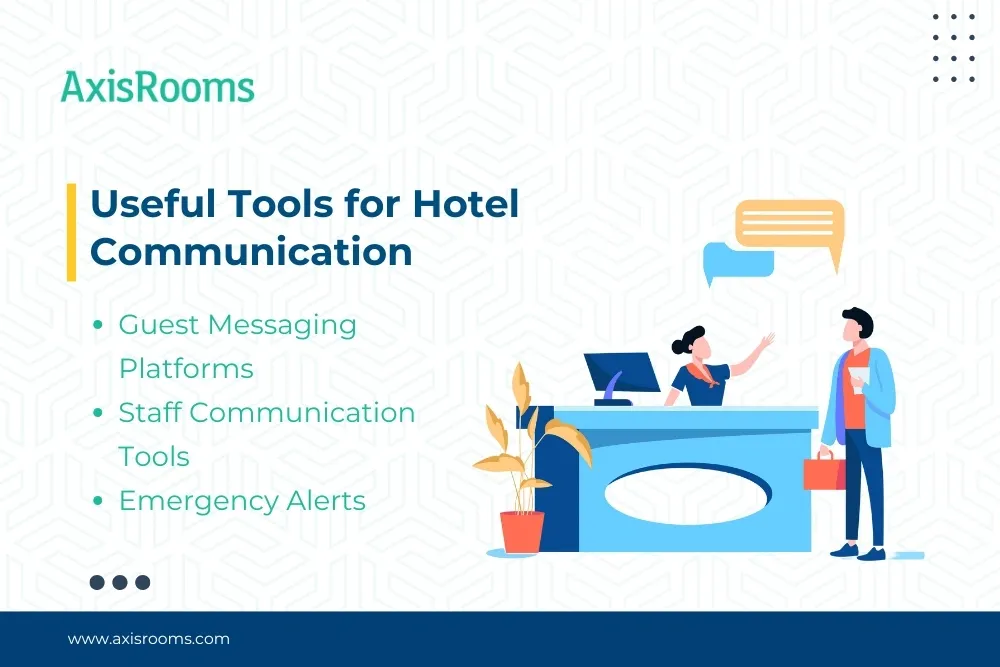1. Why Good Communication Is Important in Hotels
Running a hotel means making sure everything runs smoothly—from check-ins to clean rooms, guest requests, and quick responses. If your hotel team doesn’t talk clearly with each other or with guests, mistakes happen. Guests get upset, staff get confused, and the hotel loses business.
- Hotels that follow clear communication systems see 23% more guest satisfaction and 17% fewer mistakes.
- Around 70% of guests want messaging options during their stay, and hotels using guest messaging make 130% more per booking .
Even smaller independent hotels can benefit greatly from a structured communication system. It helps save time, reduce stress, and ensure guests are happy from the moment they book to the time they check out. The better your communication, the better your reputation and chances of repeat bookings.
2. Two Types of Communication You Need to Focus On

A. Communication Within the Hotel Team
Clear team communication helps your staff stay updated. This includes front office, housekeeping, kitchen, maintenance, and security. When everyone on your team knows their responsibilities and has access to timely information, hotel operations become smoother and problems are solved faster.
A hotel with good internal communication also helps new staff learn quickly. With clear messages and logs of ongoing tasks, even temporary or seasonal staff can stay in the loop and maintain the hotel’s service standards.
B. Communication With Guests
Guest messages should be fast, friendly, and useful. This makes guests feel cared for and improves their stay.
What You Can Do:
- Before arrival – Send a message with check-in time and welcome note. Offer add-ons like early check-in or spa booking.
- During stay – Let guests message the front desk for anything they need.
- Service updates – Tell them when food, room service, or transport is ready.
- After check-out – Thank guests, ask for reviews, and send offers to come back.
Remember, guests like to feel remembered. Use their name in messages, mention their preferences if possible, and be consistent with follow-ups. This kind of personal touch can turn a one-time guest into a loyal customer.
3. Useful Tools for Hotel Communication

Guest Messaging Platforms
- Cloudbeds, GuestTouch, Duve – Easy for SMS, WhatsApp, or in-app messages.
- ALICE – Connects guest messaging with hotel tasks.
Staff Communication Tools
- hotelkit – Lets staff share updates, checklists, shift info, and team tasks.
- Group chat apps – Good for daily tasks, last-minute changes, or emergencies.
Emergency Alerts
- Regroup, Rave – Send alerts to staff and guests quickly in case of safety issues.
These tools also reduce the dependency on walkie-talkies or paper-based logbooks, which can be lost or forgotten. Digital tools keep everyone informed, whether your hotel has 20 rooms or 200.
4. Simple Best Practices for Hotel Communication
- Use one platform for messages Don’t use WhatsApp for some things and paper notes for others. One tool keeps it simple.
- Keep your tone friendly and clear Avoid long or difficult words. Be polite and helpful.
- Go mobile Staff should get messages on phones or tablets, not just walkie-talkies or paper.
- Reply quickly Guests expect quick responses. Try to reply in under 10 minutes.
- Separate different messages Staff updates, guest messages, and promotions should all be sent in the right way to the right person.
- Update your process every few months Check what’s working and what’s not. Take feedback from staff and guests.
- Use guest data for personal touches Send birthday messages or special offers based on previous visits.
- Include communication in your training program Make sure all staff know how to use tools and understand the tone and timing of guest communication. New hires should learn communication tools during their onboarding.
5. Real Stories From Hotels
Ritz-Carlton
They follow strict communication rules and train their team well. Result: 23% more guest satisfaction.
Sydney Boutique Hotel
This hotel started sending welcome messages and alerts for maintenance issues. Within 3 months, their TripAdvisor score improved by 0.4 stars.
Viejas Resort
They use Regroup to send emergency alerts to all staff and guests. It helps them act fast and keep everyone safe.
Even if your hotel is not a big brand, these stories show that using the right communication systems leads to better service and better reviews.
6. How to Know If Communication Is Working
You can also use digital tools to track this data weekly or monthly. Reports help identify which areas need improvement and who may need more training.
7. Simple Communication Plan From Check-In to Check-Out
8. How AxisRooms Helps Streamline Hotel Communication
Improving communication also means reducing the need for constant manual updates between departments like front office, reservations, and sales. This is where AxisRooms makes a real difference.
Thanks to OTA integrations and PMS integrations, your property stays in sync across all platforms, allowing staff to work more efficiently and focus on guest satisfaction. When bookings and inventory are synced across systems, your team can focus more on guest experience and less on managing spreadsheets or last-minute updates.
AxisRooms can be a part of your larger hotel communication and hotel revenue strategy, helping you improve service, increase bookings, and reduce errors.
9. Mistakes You Should Avoid
- Sending too many messages to guests – Only send what is helpful.
- Using personal phones for hotel work – Use secure systems to protect privacy.
- Not training staff on tools – Everyone must know how to use the systems properly.
- No plan for emergencies – Practice emergency communication regularly.
- Ignoring staff feedback – Your team knows what guests want. Listen to them.
Conclusion
Good communication in a hotel means faster service, happier guests, and fewer mistakes. When your team shares updates clearly, and your guests feel heard, your hotel performs better.
Start now:
- Choose simple tools
- Train your team
- Keep messages short and clear
- Check your results every month
Better communication means better business. And when you combine good communication with the right tools and strategies, you set your hotel up for long-term success.


